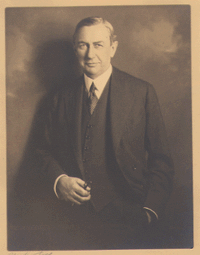
Ivy L. Lee, a pioneer of public relations.
Ivy Ledbetter Lee (1877-1934) is considered by some to be one of the modern founder of modern public relations, along with Edward Bernays.
Lee was born near Cedartown, Georgia on July 16, 1877. The son of a Methodist minister, Lee was a Princeton graduate and worked as a newspaper reporter and stringer at the World newspaper in New York City.
In 1903, he quit his poorly paid job to work in Seth Low's campaign for mayor of New York. The following year, he remained in Democratic politics, helping to handle publicity for Judge Alton B. Parker's unsuccessful presidential race against Theodore Roosevelt.
Following the election, Lee teamed up with former Buffalo newspaperman George F. Parker, with whom he had worked on the presidential campaign, and together they established the nation's third public relations firm, Parker and Lee.
The new agency boasted of "Accuracy, Authenticity, and Interest." Although the Parker and Lee firm dissolved in 1908, the junior partner, Lee, was to become one of the most influential pioneers in public relations.
During the Parker-Lee partnership, Lee represented Pennsylvania Railroad magnate George F. Baer (1842-1914). Following a major rail accident, Lee not only convinced the railroad to distribute a press release to journalists before they heard rumors about what had happened, he also invited reporters and photographers to the scene of the accident, going so far as to provide a special train to get them there.
The moves won praise from newspapers, and elected officials heaped praise on the railroad for their openness and apparent concern for the safety of its passengers.
During a 1906 anthracite coal strike, coal operators hired Lee to represent them. Lee made sure newspapers received daily "handouts" of printed materials containing all pertinent facts of the strike.
But these new "press releases" were met with hostility by newspapers, who called them mere ads and accused Lee of trying to manipuate them.
This caused Lee to issue his "Declaration of Principles," which he sent to all newspapers.
The statement was later recognized as laying important groundwork for the public relations profession in the decades to follow.
The declaration reads, in part:
- "This is not a secret press bureau. All our work is done in the open. We aim to supply news. This is not an advertising agency. If you think any of our matter ought properly to go to your business office, do not use it. Our matter is accurate. Further details on any subject treated will be supplied promptly, and any editor will be assisted most carefully in verifying directly any statement of fact. ... In brief, our plan is frankly, and openly, on behalf of business concerns and public institutions, to supply the press and public of the United States prompt and accurate information concerning subjects which it is of value and interest to the public to know about."
From the notoriety gained during the strike, Lee, in December, 1914, was hired as personal advisor to the wealthy Rockefeller family were being savaged in the press for their strike-breaking, anti-union reputation, gained after the 1914 Ludlow, Colorado massacre in their mining operation there.
Humorist Robert Benchley was said to have mocked Lee for seeming to suggest "that the present capitalist system is really a branch of the Quaker Church, carrying on the work begun by St. Francis of Assisi."
But Lee's advice to industrialist John D. Rockefeller, Sr. (1839-1937) truly helped soften the image of both he and his family. Rockefeller, who was very eld allowed himself to be filmed playing golf and giving away dimes to children. By the time of his death in 1937, it was said more people remembered Rockefeller's dimes than the massacre.
In his later life, Lee courted further controversy for his representation of the Soviet Union - in an attempt to improve trade relations between the U.S. and Soviet Russia - and the IG Farben firm in Nazi Germany. Accusations that he was tied to either Communists or Nazis were never proven, however.
Lee died of a brain tumor in New York City, Nov. 8, 1934.
In 1965, the Georgia Historical Commission posted a historic marker in Rockport, Georgia in Lee's honor. It reads, in part:
- Ivy Ledbetter Lee, public relations expert, author, lecturer, and philanthropist, was born July 16, 1877, near Cedartown. He attended Emory College for two years and then went to Princeton, where he earned his A.B. in 1898, paying his way by working on university and New York newspapers. In January, 1899, he arrived in New York "with a raincoat, a diploma, and five dollars," and found work as a reporter.
- In 1904 pursuing his idea that Big Business needed better public relations, he opened a counseling office in New York. By 1915 he had begun a lifetime association as John D. Rockefeller's publicity counsel, especially in Rockefeller's widespread benevolences. Among Lee's other clients were the Pennsylvania Railroad and Bethlehem Street, as well as numerous charities and churches to which he donated his services.
Trivia[]
- Through his sister Laura, Lee was uncle to novelist William S. Burroughs.
External links[]
References[]
- New York Times article of February 13, 2005, "Spinning Frenzy: P.R.'s Bad Press," by Timothy L. O'Brien.
- Online readings in Public Relations by Michael Turney
- Effective Public Relations. Scott M. Cutlip, Allen H. Center, Glen M. Broom. Prentice Hall, 1985.
- Columbia Journalism Review, July/Aug. 1998 "The Wizard of Money Meets the Press."
| This page uses some content from the English Wikipedia. The original article was at Ivy Lee. The list of authors can be seen in the page history. As with prWiki, the text of Wikipedia is available under the GNU Free Documentation License. |